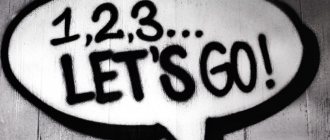Personal story of how I overcame my fear of speaking
It so happened that I was chosen for the position of internal coach in my absence (I was on vacation). According to the criterion of having the “necessary” psychological education. That is, without my desire and prior consent.
I was sent on a business trip for a 4-day training. In 4 days they taught us the basics of conducting trainings and trained us as trainers. Before this, I had no experience speaking in front of people. For some reason, no one remembered or taught how to cope with fear before performing.
The peculiarity was that it was a part-time position. A pilot project, so to speak. And I had to perform 2 times a month in front of managers. That is, the rest of the time, I worked one step lower on the career ladder. At times I had to train line managers, and even my immediate supervisor. Can you imagine the situation?
In 4 days we were given a lot of information, given 80 files on a flash drive and 2 months to prepare. Actually, no one asked whether you want it or not, whether you are afraid or not. This happens in huge corporations. Either agree or...
There was nothing to do besides my main job, in the evenings and on weekends I studied and read about how to perform. I didn’t think about fear until I had mastered all the materials I had received and, at the same time, books for speakers that I had ordered online.
The question of how to overcome fear of speaking arose within two weeks.
I want to summarize and describe the techniques that helped me overcome fear and anxiety. I will describe it on a timeline:
- Long before the event
- About a week (sometimes 3 days)
- 20 minutes before the performance
- When there are 5 minutes left before the speech
- During the first words
These recommendations are a distillation of my own experience as a speaker, coach and leader.
Reviews and comments
Practice, use different techniques so as not to worry and not be afraid of public speaking and remember: “A speech needs an exciting beginning and a convincing ending. The task of a good speaker is to bring these two things together as much as possible” (G. Chesterton).
You can discuss your experience and knowledge on the topic below.
We also recommend reading:
- Storytelling
- How to win the hearts of your audience: a cheat sheet for successful public speaking
- Tips for working effectively with your audience
- Techniques for a successful presentation: a selection of useful materials
- Preparing and delivering a speech
- Preparing for a Public Speaking
- Black rhetoric. Part five. Directing a performance and dealing with fear
- Beginning of public speaking
- Secrets of charisma during public speaking (part 2)
- Overcoming Fear
- Closing a Speech: 9 Effective Techniques
Key words:1Rhetoric
Recommendations on how to overcome the fear of public speaking (long before the event)
If you always feel embarrassed in front of a large number of people, but still understand that speaking skills will be useful, for example, in a professional career, then start preparing in advance. And then, it seems to me, every manager or leader, for example, should be able to convince with words. What kind of conviction is there if he is afraid to speak?
Let's assume you decide to fight this fear. Then start training at home right now. After all, one of the components of fear is uncertainty in one’s abilities.
Follow these recommendations point by point, increasing in complexity. After 3 months, you will understand that you can already say something in public, for example, a toast. And most importantly, you get a positive response. Because diction has improved, the pace of speech adjusts to the topic. Use emotions - make your speech more beautiful.
Over time, you will understand that you can complicate the task, since animal fear appears less and less often. So:
5 recommendations:
- Read fairy tales aloud. Yes, exactly fairy tales. Since they are written in simple language and for training and gaining inner confidence, this is just the thing. Exactly out loud. Since only in this case articulation and diction are practiced.
- Read economic news out loud. This unusual advice lies in the complexity of the text. Practice will give you freedom in any performance, and of course, a decrease in anxiety.
- Retell any story to your friend or family member. If you’re really embarrassed, just talk into the recorder. But then - a voice recorder - this will be an intermediate stage. Then, nevertheless, you need to tell something to a living person. Get into the habit of telling something you read for 10 minutes. In addition to relieving tension in the head and body, a good habit of communication in the family is also acquired.
- Make it more difficult for yourself: approach a stranger on the street and ask for directions to any route. This exercise removes the fear of communicating with strangers. Over time, you will understand that you can calmly survive even a refusal.
- Do these practices without interruption for a single day, at least for 5 minutes.
Because the practice of “speaking”, communicating with strangers, has a lot in common with performances. The brain, and the body, gets used to these tasks and stops reacting violently with stress and wet palms when necessary to stand up and publicly express your opinion.
Practice and more practice will lead you to the fact that over time you will receive a positive response to your speeches. This means that the fear that squeezes your throat and shakes your knees will pass. And also use your imagination - draw yourself a picture of your success. For self-confidence, recite affirmations (there are many examples here).
After all, overcoming yourself is development, and after a while you will be looking for opportunities to perform somewhere to get your adrenaline and emotional charge. You can read how else you can start self-development here.
Coming out of the darkness: how to overcome the fear of publicity
A subconscious resistance to publicity stands in the way of many talented people. It prevents you from taking your business to the next level. Due to the closed environment, careers are destroyed and businesses are closed...
Even if you have an excellent customer base, strong word of mouth and a good reputation today, there may come a time when the market turns its back on you. Now this happens much faster, and usually due to the fact that competitors, thanks to competent PR, have taken the lead.
One of the reasons why so many worthy specialists vegetate in obscurity is a refusal to go public: fear of making themselves known or other stereotypes regarding emerging from the shadows.
This is not about advertising your services, but rather about drawing attention to your person - including values and motives, personal life and hobbies, work routine, difficulties and victories.
“I’m not ready to write and talk about myself” - if this reaction is typical for you, let’s figure out where it comes from and how you can work with it.
Those who managed to finish school during the Soviet Union could absorb socialist ideology and accept that “I” is the last letter of the alphabet. Don’t announce yourself, don’t stick your head out until your comrades nominate you, keep up with the team.
The same approach is followed by many parents, for whom it is more important to raise a comfortable and obedient child than to teach him to express his opinion and individuality - after all, the child’s opinion may not coincide with the position of the parents.
As a result of such upbringing, you may experience guilt and shame instead of joy in your individuality. Even if childhood is long behind you, the world has changed, and you have long been an accomplished person.
What to do:
Understand that times have changed, your parents and teachers lived or are living in the past. And today, declaring yourself to the world is normal and absolutely decent. You no longer have time to wait for someone to notice you, appreciate you and put your photo on the “board of honor” - you have to fill out this board yourself.
The second enemy of publicity after education is fear of mistakes and perfectionism .
“What if I don’t succeed and I disgrace myself in front of my friends, partners or clients?” - as a result, perfectionists do not start something they are not sure of, spend years studying, although it is high time to move on to practice, play it safe and stall for time while more daring (but not more experienced!) competitors take it and do it.
In fact, mistakes and their public living are the best school for success, because this is real life, and those around you can not only condemn, but also help or suggest a solution.
What to do:
Specifically voice what doesn't work, and you will find that people will sympathize with you. Learn to face up to negative reviews and benefit from them. Try more and talk less in theory.
“At 18, you care what people think of you. At 40, you don't care what people think of you. At 60 you already know that no one thought about you at all." - John Fowles
The following stereotype against openness: “Happiness loves silence” In the 90s. It was indeed dangerous to claim success, but those days are long gone. Today, presenting yourself is as normal as handing out a business card.
People who are confident that everyone around them envy them, want to jinx them, wish evil, are usually suspicious themselves and are not very friendly towards others. These qualities interfere not only with creating a personal brand, but also with building good relationships with people and new opportunities.
What to do:
Try an experiment - write actively on social networks for a month and tell people about your life, and discover that you are not judged and are not even particularly watched. It may turn out that you are still worried that you are receiving less attention than you expected. Consider how openness can motivate both you and others.
Another interesting psychological observation about resistance to publicity: so-called modesty is, in fact, an exaggerated sense of self-importance . How can this be? Very simple. Open people who easily talk about themselves think less about how they are assessed, who will say what, and generally do not feel that their every move is being examined under a microscope. While modest and secretive people are sure that their every word is being watched - isn’t this delusion of grandeur?
What to do:
The more relaxed you are about people knowing you and talking about you, the less focused you really are on yourself. What a 180 degree turn! Think more about the benefits that openness can bring to your life than about the fear of emerging from the darkness. Here are the benefits of being public:
1. Refusal of perfectionism, willingness to make mistakes and report them. 2. Developing stress resistance through a willingness to listen to different opinions and be visible. 3. The emergence of new interesting acquaintances and unexpected opportunities. 4. Living with the times - today is the time of media personalities. 5. And finally, building a personal brand that will speed up any of your endeavors!
Do you want business? Do you want success? Overcome your fear of publicity. Crawl out of the hole. Let it be blinding at first, let it be scary, let it be incomprehensible, let there be mistakes - everyone is scared, everyone is incomprehensible, everyone makes mistakes. This is not fatal. Any famous person will confirm this to you.
Lifehack for removing a clamp - 3 quick exercises (5 minutes before the start)
When there is less and less time left until the moment of entering the stage or podium, it begins to “sausage”.
Having many years of speaking practice and knowing how to overcome the fear of public speaking, I can say that the excitement does not go away, regardless of practice and numerous repetitions. It is always there, but it is quite possible to reduce the physical manifestation with the help of these simple exercises.
- The exercise can be done right before the exit, when the audience has gathered, it’s your turn in 2 minutes. This can be done unnoticed by others.
This exercise is based on breathing. Take a deep breath - hold your breath - exhale slowly. You can do this on account. 5-5-5 or 7-7-7. Who has enough oxygen? The lungs are enriched with oxygen, and not only do emotions become balanced, but the head begins to think better and the brain is ready for active action. This leads to: a. to reduce the intensity of emotions, b. to a bright head.
- The exercise is based on physical tension and relaxation. We have noticed that sometimes the tension before a performance reaches such a climax that a spasm seizes the throat, the knees begin to shake and the fingers involuntarily squeeze the handle to the white knuckles. This tension can be quickly relieved, literally in 30 seconds, by clenching your fingers into fists as much as possible, and then, with the same effort, unclench your fingers and spread them to the side. It would be nice to do this with your toes at the same time, at least try. 5 times this muscle tension is enough to remove the physical manifestations of fear before a performance.
- Wash your face with cold water. Take a sip of water. After all, before a performance I always dry up with excitement. This helps balance the acid-base balance and moisten the vocal cords.
And now the time has come...
Methods for overcoming fear of public speaking
Identify the source of the fear.
We are not afraid of the performance, but of how the audience will react to it. The uncertainty is scary: what will happen after going on stage? A very important factor here is to understand that almost always the vast majority of people hope to benefit from your speech, therefore they are sincerely interested and want you to succeed.
Don't deny your fear.
If you are perfectly prepared for the presentation and master the topic, you have nothing to be afraid of. Fear is just a defense mechanism against a situation in which you may find yourself during a performance, but most likely you will never find yourself in it. Take it as an additional challenge and motivation. How to cope with fear, anxiety and stress is described in detail in our course “Mental Self-Regulation”.
People don't see your nervousness.
Only a few people can tell how worried another person is by their appearance. It is a mistake to assume that the audience can see how worried you are. This means that there is at least one less reason to fear.
Improve your oratory skills.
There are many books and practical trainings that will help you learn how to prepare for a speech, attract an audience, maintain contact and, as a result, make the speech more comfortable.
Analyze your performances.
Get a video of your speech and carefully analyze everything - from hesitations and parasites in speech to facial expressions and gestures. You can do the same only before the performance: use a laptop camera to record and watch from the side. As Seneca said: “Before you say anything to others, say it to yourself.”
The most important thing is preparation.
Confidence comes from being in control. Make sure you know the material, try to predict the questions. Make a detailed plan for your speech and break it down into main points to remember. Make the speech not boring, include a couple of jokes, quotes, stories.
Make yourself smile
as soon as they came on stage. Psychologists are sure that smiling relieves stress. Moreover, on a subconscious level, this will endear you to part of the audience.
Relaxation.
There are many techniques for relaxation, self-hypnosis, based on meditation or breathing exercises. The following exercise can be used as an example. Focus all your attention on inhalation and exhalation. Breathe deeply, holding your breath for a few seconds. As you exhale, count in your mind from 1 to 5. Focus for at least 5 minutes, this will relieve tension.
What else can help a speaker overcome public fear?
Target
Knowing the purpose can overcome a speaker's anxiety and fear of speaking. Before the performance, determine the goal that you want to achieve. Very rarely is it “just a report.” Find meaning for yourself, even if it is regulated, and at first glance, useless participation.
Come up with a benefit, or what you teach to those sitting in the hall. This meaning is exactly what you need to relieve anxiety and fear of performing. Focus your efforts specifically on conveying the meaning to the public.
The head is like a vessel in which one thing fits, either fear with endless “what if,” or the disclosure of a topic. It’s just that if the topic is not interesting to you personally, then it will take much more effort to shift the fear to the side.
You may be interested in articles on the topic:
- How to find purpose in life
- Methods of dealing with fears
Mistakes in dealing with a phobia
Some publications write that you can imagine people sitting in the hall in their underwear. I wouldn't do that to overcome stage fright. In fact, the energy during the performance is very noticeable. What thoughts and mood does the speaker come out with? Even the first excitement is forgiven to a benevolent speaker. And then no one will remember about the involuntary hitches. And if a person comes up with a condescending pose and a look from top to bottom, expect trouble. The audience feels this very sensitively - it has been verified more than once (by observing other speakers).
I think the recommendations to drink a sedative before a performance are wrong. The level of fear may be decreasing. But there is also a slowdown. Where it is necessary to speak with strong enthusiasm, to interest the audience, to give in to emotions, it will come out sluggish and insipid. And as a result, it will not be possible to convey information to people.
Everyone is scared. And that's okay
Fear of public speaking is the most common request people come to me with.
First, let's decide that it is quite normal to worry when speaking in front of people, even if it is not an audience of a thousand, but just a group of ten people.
Don't think that there is something wrong with you. Believe me, absolutely everyone is worried - both those who have been constantly giving lectures for the last twenty years and those who are just about to appear in front of the public.
The only difference is that an experienced expert knows how his body will react to a stressful situation. He knows how to help himself so that the quality of the performance does not suffer and the audience leaves satisfied. The newcomer is overwhelmed with excitement. He, without knowing it, spoils his opportunities.
It is important to remember that public speaking is not the norm for a person, we perceive ourselves as part of a pack, a team, it is more common for us not to attract attention to ourselves, not to separate ourselves, but to express our opinion at will, and not because of production necessity.
The situation is unpredictable and brings tension for absolutely everyone. Here I would not divide by gender and age - only the experience that you have behind you plays a role. It allows you to make your excitement work for you.











